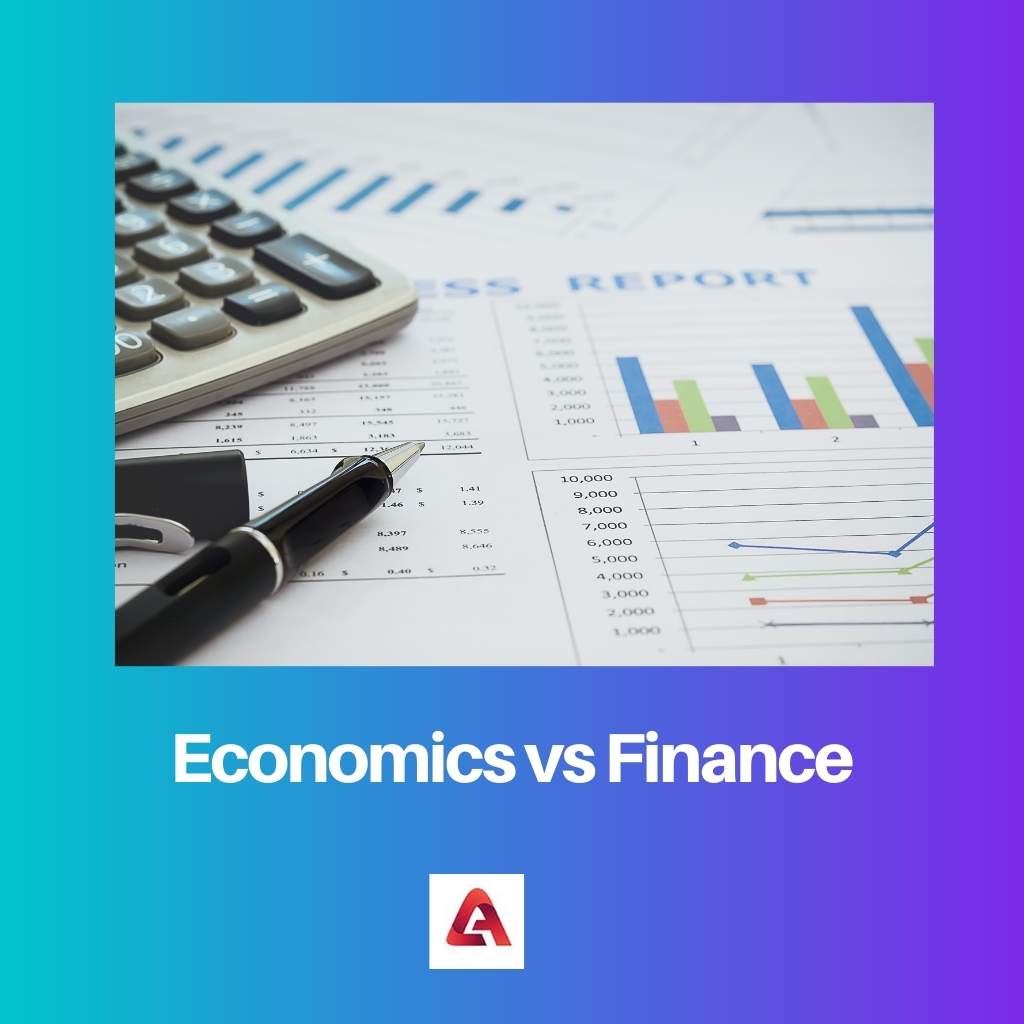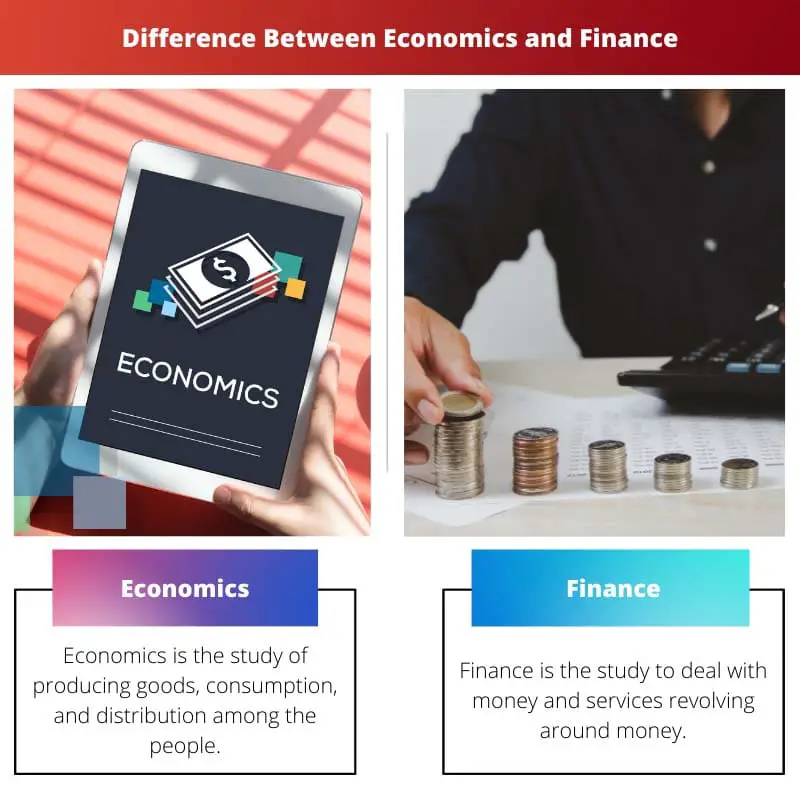Many factors determine the development of a country. From its Gross Domestic Product value to financial management, analysts keep pumping the country’s worth and growth.
Economics and finance play a key role in shaping the country. However, they’re related to each other but are way different disciplines.
Key Takeaways
- Economics studies how societies allocate scarce resources to fulfil their needs and want, while finance focuses on managing money and other financial assets.
- While economics is concerned with broad macroeconomic factors such as inflation, unemployment, and economic growth, finance is more concerned with the microeconomic factors that affect individual businesses and investors.
- Economics seeks to explain the behavior of individuals, businesses, and governments within a larger economic system, while finance focuses on applying financial principles to real-world situations.
Economics vs Finance
The difference between economics and finance is that economics is a discipline or a social science where people are taught about the production, consumption, and distribution of goods and services, while finance is all about managing funds across the country, businesses, lending, borrowings, and many more. Economics manages the demand and supply ratio, while finance manages the distribution of money in different sectors.

The economics, or we say the economist is someone who studies to deal with the goods and services that are supplied and consumed across the country.
Economics lets you know how a country’s consumption is and what exactly a nation seeks in demand. With this study, Analysts can determine how much production, import, and export has to be made to maintain stability.
The finance or fiscal study is all about money and concepts related to money. The country’s growth and development depend on how much money is being spent on it.
Well, there can be many types of finances from the grassroots level to higher levels. But eventually, it rotates around money lending, borrowings, investments, and expenditure.
Comparison Table
| Parameters of Comparison | Economics | Finance |
|---|---|---|
| Definition | Economics is the study of producing goods, consumption, and distribution among the people. | Finance is the study to deal with money and services revolving around money. |
| Main dealing | It deals with goods and services to maintain the balance of demand and supply formula. | Finance deals with money and how to spend it effectively. |
| Classification | Economics is classified as microeconomics and macroeconomics. | Finance can be for personal finances, public finances, corporate finances. |
| Objective | Economics focuses on the optimization of items and goods and maintaining the demand and supply formula. | Finance focuses on maximizing wealth. |
| Crisis involved | Economic crisis can be because of hyperinflation, currency crisis, etc. | The financial crisis could be because of bank debts, sudden stop crisis, etc. |
What is Economics?
A country’s development is measured in many ways, from the demand and supply ratio to fiscal values. For a country to convert its state from developing to developed, it has to build a robust and long base to maintain the crisis if it happens.
So to maintain and manage these sorts of issues, analysts keep on analysing facts and figures.
It’s a study of economics that deals with the goods and services distributed, consumed, and produced in a nation. It teaches how institutions, individuals, and businesses set up their plans to buy and allocate resources.
It can be said as the study of humans as to how and what exactly they focus on, like which products they prefer and which ones do not.
Trading and labour are also included in the study of economics. Well, it can be classified into two categories: microeconomics and macroeconomics.
Macro, as the name suggests it focuses on consumption, Production, and distribution on a larger scale, while microeconomics focuses on smaller levels like businesses and people.
Its objective is to optimize consumption and balance the demand and supply formula.
The gross domestic product and consumer price index are some of the terms and figures that are in economic books. It tends to increase the efficiency of the production and distribution of goods and services.

What is Finance?
If you have money, you are in the finance department. If you have ₹100 and you have to make expenses, you will save some amount for the future, and you’ll pay bills and rent, and the leftover money you can use for shopping, buying cinema tickets, or even use to dine out.
If you look closely, you’ll realise how you’re dealing with your money to maintain a balance.
Finance is the study that involves money lending, borrowings, expenditure, investments, and many other aspects. A country’s finance minister is a person that makes sure the money keeps on rotating without increasing inflation.
Also, finance is a term where Analysts depict a picture of where exactly the money is being invested or spent.
It can be broadly divided into many parts. The major ones are public finance, corporate finance, and personal finance.
Public finances include budgets to develop public sectors, roads, water wells, tanks, canals, defence forces, every public booth, and many more. Corporate finances deal with developing corporate premises, employees, Maintainance, etc.
Personal finance is all about how an individual deals with his own money to meet the requirements. Eventually, the aim and focus are to develop, stabilise, and prevent any crisis. Finance plays an important role in shaping the country.

Main Differences Between Economics and Finance
- Economics is the study of production, consumption, and distribution of goods and services, while finance is the study of money.
- Economics deals with goods, items, and services, while finance deals with fiat currencies.
- Economics is classified into micro and macroeconomics, while finance is divided into personal, public, and corporate finances.
- The objective of the economic study is to optimize consumption, while the objective of the finance study is to maximize wealth.
- If a crisis happens, economist deals with hyperinflation, and currency storage, while finance Analysts deals with sudden stop of money, and fiat inflation.

- https://www.cabdirect.org/cabdirect/abstract/19931859579
- https://link.springer.com/chapter/10.1007/978-0-306-47828-4_21

Both economics and finance are crucial for understanding and managing a country’s economic system. This article provides valuable insights into their roles and impact on a nation’s development.
Absolutely, Heather. The distinction between economics and finance is vital for making informed decisions about resource allocation and economic management.
This comparison table is quite informative. It highlights the key differences between economics and finance in terms of focus and their respective impacts on an economy.
I completely agree. The table provides a clear framework for differentiating between the two disciplines.
Absolutely, Harry. The breakdown of parameters and distinctions between economics and finance is extremely valuable for understanding their implications.
Understanding the differences between economics and finance is essential for policymakers and economists. Both disciplines are crucial for managing a country’s economy.
Absolutely, Harrison. The article offers valuable insights into the unique roles of economics and finance in shaping a country’s economy.
Indeed, Chris. The distinction between economics and finance is fundamental for making informed decisions about a country’s economic policies and strategies.
The comparison between economics and finance is quite enlightening. Economics deals with goods and services while finance revolves around money management. Both have their own objectives and classifications.
A clear distinction between the two disciplines – economic and financial principles are essential for the functioning of a nation’s economy.
Absolutely, Alison. Understanding the unique roles of economics and finance in a country’s development is crucial for policymakers and analysts.
The article provides a detailed comparison between economics and finance, shedding light on their distinct attributes and contributions to a nation’s economic well-being.
The article accurately describes economics as the study of goods and services, while finance deals with money management. Both these disciplines are vital for the growth and stability of a country.
Well said, Francesca. The article offers a clear distinction between economics and finance and highlights their respective roles in a country’s economy.
I couldn’t agree more. The in-depth analysis of economics and finance is crucial for understanding their impact on a country’s development.
The comparison table effectively outlines the key differences and objectives of economics and finance. It’s essential to understand these concepts to comprehend their significance in managing a country’s economy.
Exactly, Leo. The article offers a comprehensive comparison that enhances our understanding of the distinct roles of economics and finance.
I couldn’t agree more. The clarity provided in the comparison table is essential for policymakers and financial analysts.
Economics and finance are both integral parts of a country’s development. While economics focuses on the allocation of resources and fulfilling needs, finance is more about managing funds and assets. Both are vital for stability and growth.
Well said, Jonathan. It’s important to understand the differences between economics and finance to comprehend their individual impacts on a country’s economy.
I completely agree. They are interconnected but focus on different aspects of a country’s economic system.
The detailed breakdown of economics and finance helps in understanding their distinct roles and impact on a country’s development.
The article provides a comprehensive overview of the differences between economics and finance. They are both essential for managing a country’s monetary and economic systems.
Indeed, Francesca. The article delineates the distinct roles of economics and finance in a country’s economy with great clarity.
I couldn’t agree more. The clarity in defining economics and finance is key to understanding their roles in a country’s prosperity.